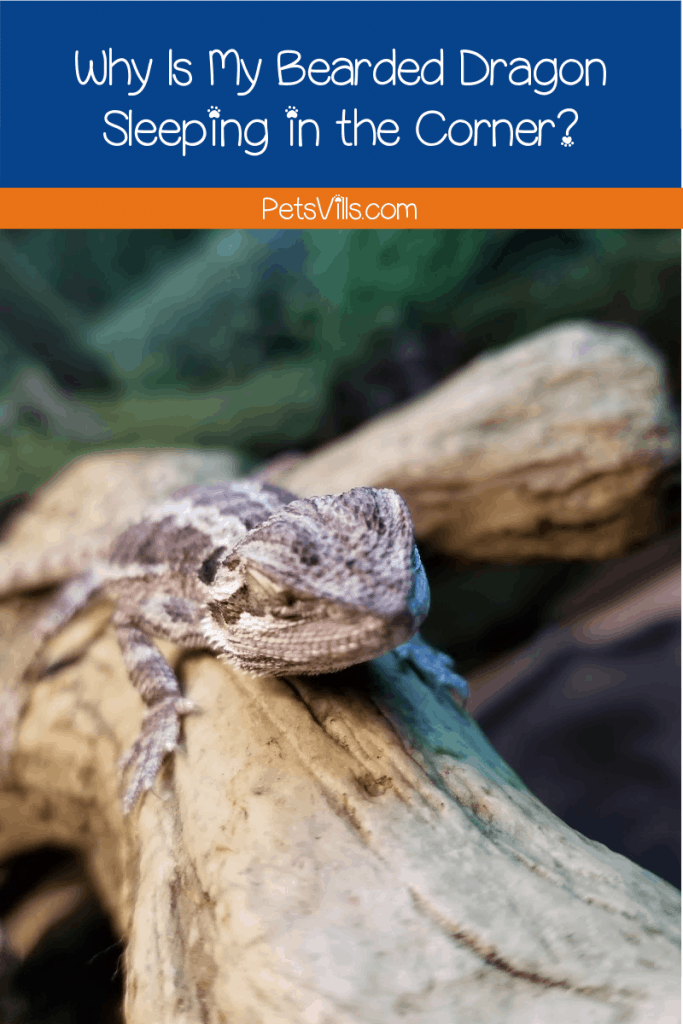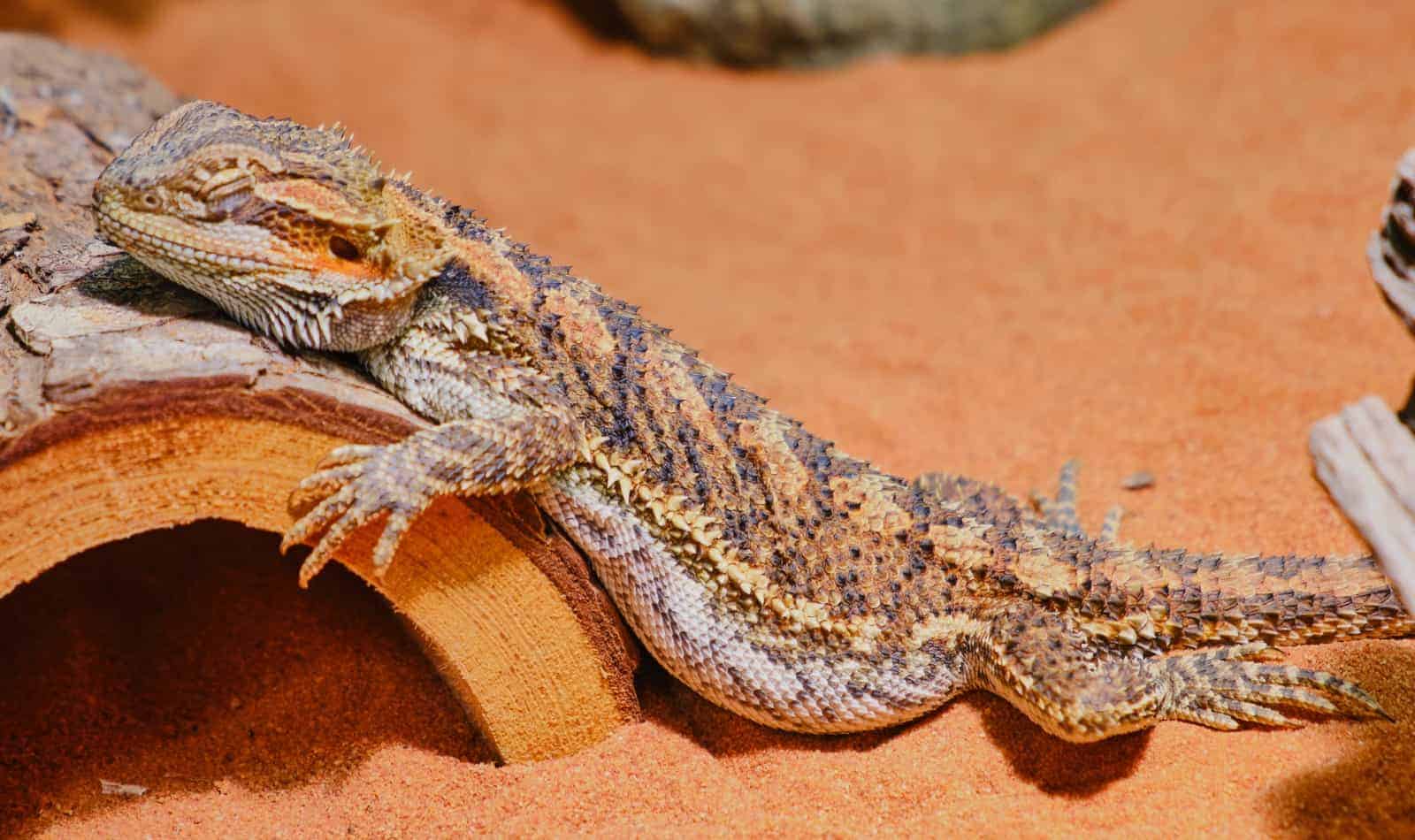Are you wondering why your bearded dragon is sleeping in the corner?
Beardies have some of the strangest sleeping habits.
One second they’re sleeping normally, then the next you find them napping in a whole new spot.
Keep reading to find out what’s normal and what isn’t when it comes to their random positions!
READ MORE: How Long Do Bearded Dragons Sleep?
Table of Contents
WHY IS MY BEARDED DRAGON SLEEPING IN THE CORNER?
It’s perfectly normal for bearded dragons to sleep in the corner.
They may have just realized it’s the ideal sleeping spot. Or the temperatures at the corner are more favorable compared to the other sections of the enclosure.
However, they could also be feeling lazy or lethargic due to health issues. If this is the case, try finding out why they are acting this way with your veterinarian’s help.
I will discuss all the reasons your beardie is sleeping in the corner in detail, and what you need to do.
FYI, this post contains affiliate links. If you make a purchase through these links, we earn a small commission at no extra charge to you.
Why Is My Beardie Acting Lazy or Lethargic?
These habits are normal during some times of the year, but health issues could also cause them.
But before we go into the causes, let’s first differentiate between lethargy and laziness.
What’s the difference between lethargic and lazy?
Laziness is when your beardie becomes inactive for some time during the day, but after a few hours, they’re back to their normal routine.
This is normal, and you don’t have to worry about it.
On the other hand, when lethargic, a beardie remains unresponsive for days.
Monitor your beardie for a few days, and if the inactiveness persists for several days, contact your vet for diagnosis and treatment.
Reasons Why Bearded Dragons Act Lazy or Lethargic
Brumation in Winter
Both warm-blooded and cold-blooded animals enter deep sleep in winter. For warm-blooded animals, it’s known as hibernation.
But for cold-blooded animals such as bearded dragons, it’s known as Brumation. During this deep sleep, they eat little to nothing at all, and they barely move.
If it’s your first time owning a bearded dragon, it may be a bit scary, but your pet is fine.
Even though some pet owners wake their beardies for grooming and petting, it’s not advisable.
Since it’s a normal process that they acquired when in the wild, you can’t stop it.
Unfavorable Temperatures
Incorrect temperature is another reason your bearded dragon sleeps at the corner or acts lazy or lethargic.
Bearded dragons are cold-blooded, which means that their surrounding environment directly affects their body temperatures, altering some of their body functions.
If it’s too hot or too cold, they’ll probably hide at the corner.
Your beardie’s enclosure should have three types of temperatures;
- Ambient – This is the overall temperature of the vivarium. It should range from 80-85 degrees F.
- Basking Area – Bearded dragons basking. So, create a section with temperatures ranging from 95 to 110 degrees F.
- Cool-down area – This is the area that facilitates thermoregulation. Cool-down area temperatures should range from 70-75 degrees, especially at night.
All three of these areas are essential. Without thermoregulation, your beardies may not develop as they should, and it exposes them to other health issues.
A thermostat is essential to help you regulate the temperature in the tank at all times.
Check out more bearded dragon fun facts.
Dehydration
Captive-raised bearded dragons are more susceptible to dehydration compared to those living in the wild.
It’s your job as a pet owner to make sure they get regular baths and safe drinking water, preferably dechlorinated water.
Since they may not always want to drink from the bowl, you can try using a dispenser or a dripper (like the one pictured above).
Fill these tools with dechlorinated water and let it flow into the bowl.
The rippling effect caused by the drip makes it easier for bearded dragons to sense the water like they would in the wild.
Stress
Besides sleeping, your beardie could be hiding in the corner because he’s under stress.
And there are several reasons why he could be stressed, including inappropriate lighting or inadequate temperature.
Your bearded dragon may also be afraid of people, especially strangers. And he could also be scared of your cat, dog, or any other pets you have in your house.
If you realize he’s under stress, check all the conditions in the vivarium and make sure they’re up to standard.
Inadequate UV Radiation
Bearded dragons need a lot of UVA radiation to maintain normal body functions. If they’re not getting enough, they may appear lazy.
If lighting is the issue, consider using compact fluorescent bulbs, Mercury vapor bulbs, or fluorescent bulbs.
The bulbs should be on for at least 12 hours per day and be at least 12-inches from the beardie.
Impaction
If your bearded dragon is stuck at one spot or having trouble moving, he/she could be suffering from impaction.
This is a condition characterized by a buildup of matter in the beardie’s intestines, also known as constipation.
It’s caused by feeding on wrong foods such as grains, feeding on a substrate such as sand in the enclosure, or feeding on very large pieces of food.
The reason they find trouble moving is that this condition paralyzes the hind legs.
Impaction is a fatal condition that should be treated by a qualified reptile veterinarian.
Parasites
Parasites cause discomfort, drain energy and even cause weight loss. Ticks and mites live on the beardie’s skin, while parasites like pinworms exist on the digestive system.
One way to diagnose a parasite problem is if the poop is smelly, runny and not in solid form, and lacks urates.
To prevent a parasite infestation, clean the vivarium regularly, and check the food you’re feeding your pet.
If you’re not sure of the type of parasites, take a sample of the stool to the veterinarian.
Shedding
When your bearded is trying to shed, they may be inactive, eat less, and hide out in the corner of the enclosure.
You can facilitate proper shedding by bathing your beardy with warm water.
He’s Scared of Other Beardies
If you have 2 or more bearded dragons in one cage, some of them may exert themselves as the alphas.
As a result, they will “own” the basking spots, sleeping spots, and even take food from the other cage mates.
The meek bearded dragon will escape to the corner, eat less, and appear weak. It’s not advisable to place beardies in the same cage. Try as much as you can to separate them.
Other Health Conditions
Below are more reasons why your bearded dragon sleeps or wants to spend more time at the corner;
Adenovirus
If your beardy has a poor appetite, is partially paralyzed, or appears weak, he may be suffering from Adenovirus.
This is a very fatal and contagious disease that, unfortunately, has no cure.
All you can do is isolate him from the other pets, and ease the symptoms with the help of a qualified veterinarian.
MBD (Metabolic Bone Disease)
MBD occurs due to a lack of calcium and Vitamin D3 in the bearded dragon’s diet.
It also means they’re not getting enough full-spectrum (UVA) lighting. Some symptoms include swelling in the spine area, lethargy, and weakness.
Respiratory Infection
If the lethargy is accompanied by sneezing, discharge, or breathing difficulties, your bearded dragon may have a respiratory infection.
This may be a result of poor vivarium maintenance, or the vivarium is too cold for him. Nutrient deficiencies and stress are other causes of respiratory infections.
FAQs
DO BEARDED DRAGONS NEED LIGHT AT NIGHT?
Bearded dragons don’t need any type of light to sleep at night. The light will only make it more challenging for them to sleep.
WHY DOES MY BEARDED DRAGON SLEEP AGAINST THE GLASS?
If he sleeps with the neck or belly pressed against the glass, he is most likely trying to cool himself down. This often happens when the temperature in the vivarium is too high or lacks an ideal gradience.
Conclusion
I hope that clears everything up. Your beardy probably just loves sleeping in the corner compared to other sections.
But sleeping and hiding out in the corner could also result in a wide range of other behavioral and health issues.

do you have other ideas why my bearded dragon is sleeping in the corner? Share below!
Barry Stingmore is a British content writer living in Fuerteventura, Spain. An animal lover at heart, he shares his home with a dog and four rescue cats and has a passion for writing about animals big and small.
Barry loves finding answers to your animal-related questions, the more research involved the better! You can rely on him to find the facts.
Find him on FACEBOOK, TWITTER AND Linkedin
Read his latest ARTICLES.
Find more about him HERE.

